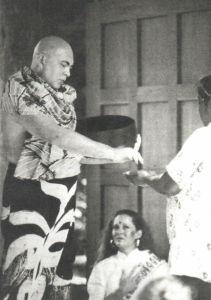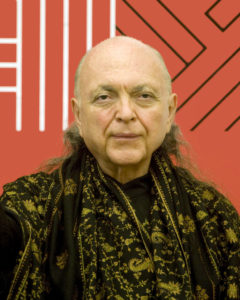Culture of Respect
Do You Shake Your Guru’s Hand?
Adi Da Samraj, January 6, 1990

AVATAR ADI DA SAMRAJ: People generally tend to approach Me through the habits they have acquired in conventional society, which, in most parts of the world today, is based upon the “egalitarian principle” that no one is superior to any one else. Such a society may, in general, be a society of political and social equality and commonality, but it is basically not a culture of respect. Indeed, individuals in such a “society of equals” generally presume that they are inherently superior. In fact, in “officially” egalitarian cultures, taboos and forms of suppression appear that work against right acknowledgement of those who are worthy of respect.

Thus, on the basis of the “egalitarian principle”, all “human” communications are reduced to the quality of a handshake instead of a pranam. And, because of the presumption of equality, people in egalitarian societies tend to have great difficulty relating to a Sat-Guru with due and proper respect. As a matter of fact, there is a general “egalitarian presumptuousness” that is actually disrespectful toward the Divine, and toward anyone who has, to any degree, Realized the Condition That Is God, Truth, or Reality. Indeed, there is, in egalitarian societies, a tendency for people to be especially and casually abusive and disrespectful to any and all Spiritual Teachers, and any and all non-“establishment” religious leaders, and even any and all non-“establishment” religious or Spiritual practitioners.
“In the domain and culture of Spiritual life, there must be hierarchies of responsibility and, therefore, of acknowledgement, based upon the principle of respect, rather than on the principle of presumed equality.”
As a political principle, equality is appropriate and honorable. But the principle of equality does not pertain, at least in any absolute sense, to the realities of Spiritual life. The culture of Spiritual life is inherently hierarchical, because people are not all equal to one another in terms of their present Spiritual Realization. Therefore, in the domain and culture of Spiritual life, there must be hierarchies of responsibility and, therefore, of acknowledgement, based upon the principle of respect, rather than on the principle of presumed equality.
“(People) cultivate the notion that the Guru is actually their own individualized “self”, somehow within them, and, thus, they presume to be their own “Guru”, and even, in some cases, the “Guru” for others.”
When individuals from an egalitarian society become involved in Spiritual life, they tend to dramatize the conventions of secular and egalitarian society, even within the context of the inherently hierarchical structure of sacred culture. Typically, such people even presume they are the equal of their God-Realized Guru. Therefore, they cultivate the notion that the Guru is actually their own individualized “self”, somehow within them, and, thus, they presume to be their own “Guru”, and even, in some cases, the “Guru” for others.
Generally, the people who approach Me tend to approach Me not through the style of sacred society but through the style of egalitarian and secular society, which not only is not based on sacred principles, but which is fundamentally an egoically based and ego-serving and rather adolescent system. The Way of Adidam is the ego-transcending Way. Therefore, it is inherently based on surrender of the ego-“I”, and on fullest devotional respect for Me as the One Who Is the Realizer, the Revealer, and the Revelation of the Divine Person and Self-Condition. Likewise, My true devotees characteristically demonstrate the respectful acknowledgement of individuals who are hierarchically senior to all other devotees. Indeed, any sacred or ego-transcending religion or Spiritual culture is inherently hierarchical, because it takes into account the actual signs of each and every individual’s practice. Therefore, in the Way of Adidam, special indications of respect are presently given to the members of the Ruchira Sannyasin Order, and in the future such respect will be given to other senior members of the culture, including potential and future “Murti-Gurus”.
In traditional Indian society, people honor the Sacred in one another by making the pranam, as a form of greeting. Likewise, My devotees perform various such gestures (indicating respect, devotion, and self-surrender) toward Me when they are in My physical Company, and when they are in the Company of My Murti.

Just so, when anyone communicates to Me, that communication should have the feeling of a pranam. It should have nothing of the quality of the conventional “good guy” handshake, or an attitude that addresses Me as if I were an equal on the street. Without this attitude of sila, discipline, respect, and truly self-surrendering devotion, any individual’s approach to Me is inherently abusive and presumptuous.
I would say that, in general, people in the present-day world tend, because of their egalitarian upbringing, to relate to one another in a rather disrespectful fashion. There is much egalitarian hand-shaking, struggling with one another, indulging in reactivity, status-seeking, and complaining, and a great deal of casual disrespect for anyone in a position of responsibility. Such conventional ways of relating to one another should be replaced by sila and respect, which are the signs that human beings honor the Sacred in one another’s company.
Every one of My devotees should constantly demonstrate right regard of Me, true respect for Me, and devotional submission to Me. As My truly respectful devotee, you must truly and consistently resort to Me, rather than just give lip service to Me as your Sat-Guru. And all My devotees should properly honor all those devotees who have been acknowledged by Me to be worthy of special respect. Therefore, examine the habits you have acquired on the basis of your “egalitarian mind”, and discipline all those habits by the attitudes that are characteristic of a true culture of respect.
Anyone who becomes a formally acknowledged practitioner of the Way of Adidam must have made the transition from the point of view that is characteristic of the culture of conventional equality to the point of view that is characteristic of the culture of true respect. Likewise, the leadership of the institution, the culture, and the community of the Way of Adidam must always maintain, and be an extension of, the culture of true respect. All My devotees should advocate Me and represent Me with high honor and respect. Your very manner should command respect for Me, as well as respect for yourself as My devotee and respect for the Way of Adidam that you practice in relationship to Me.
You must never forget this responsibility. The adolescent, casual, and presumptuously egalitarian handshaking communication of the conventional “good guy” is not worthy of respect, nor is it an expression of respect. In an “officially” egalitarian society, people are always smiling and laughing, or, at least, always wanting to smile and laugh. However, a true culture of true respect is not casual in any sense. The principal attitudes or signs of the culture of true respect are seriousness, depth of feeling, and balance. It is not that there is never a moment when laughter is appropriate, but laughter occurs only when it is appropriate. Laughing and smiling are not the constantly and casually expected mode in the culture of true respect. The general sign in the culture of true respect is sila, demonstrated from moment to moment.
Another characteristic of the “egalitarian personality” is superficiality, or mediocrity. In the culture of true respect, and, altogether, in the total (and right) practice of the self-surrendering, self-forgetting, self-purifying, and self-transcending Way of Adidam, superficiality and mediocrity are replaced by seriousness, depth of feeling, true “consideration”, real discipline, sila, responsibility, and respect. Therefore, these are the characteristics that I expect, and look for, in My devotees.